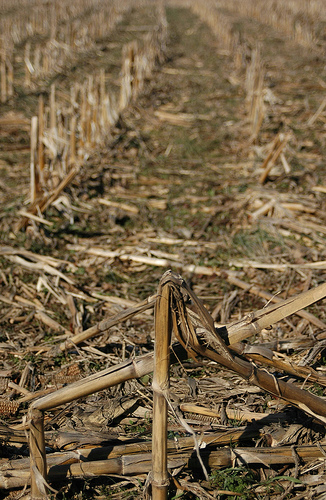GMOs
-
OMG, it’s DIY GMOs
I learned of a newly popular hobby for the masses thanks to a recent edition of Food Chain Radio podcast: amateur gene tinkerers. It’s such an obvious plot for a Michael Crichton book, featuring an innocent experiment wiping the planet’s motherboard. Why let corporations and academics in their ivory towers have all the fun? Just […]
-
Biotech’s history of overpromising and underdelivering may be catching up with it
GMOs: false promise?km6xoTom Philpott’s post on USDA chief Tom Vilsack’s comments regarding biotech deserves a bit more attention. Vilsack was speaking at the first ever meeting of the Group of Eight agricultural ministers. I guess we have to consider it progress that the top ag officials from the eight largest industrialized nations finally decided it […]
-
Breaking: Gates Foundation ag official gets USDA post
Rajiv ShahPresident Obama has named Rajiv Shah, the Gates Foundation’s director of agricultural develpopment, as Under Secretary for Research, Education, and Economics at the USDA. The Gates Foundation’s agriculture efforts have been criticized for ties to Monsanto, the globe’s largest seed company and dominant purveyor of genetically modified seed traits. In 2007, the Gates Foundation […]
-
How biotech companies control research on GMO crops
Recently I wrote about the dwindling faith the American people seem to have in science, seemingly choosing to either ignore or disregard the latest research on global warming. Why has science lost its place in the hearts and minds of America? Has the media been a culprit? Did the Bush administration dismiss one too many scientific reports? But now, a recent article leaves me wondering if science has not only taken a backseat to American thoughts, but a backseat to industry influence as well.
In Thursday's New York Times, Andrew Pollack reported on how crop scientists throughout the country have been unable to perform adequate testing and research on biotech crops, because of the strong hand of biotechnology companies. Pollack was likely alerted to the story after a group of 26 corn insect scientists from 16 different states anonymously submitted a statement to the EPA on a docket regarding the evaluation of insect resistance risks with a brand of Pioneer Hi-Bred biotech corn. In their statement the scientists noted that they chose to remain anonymous because "virtually all of us require cooperation from industry at some level to conduct our research."
Remaining anonymous allowed the scientists to fully express their real concern with biotech crop research controlled by the industry through technology and stewardship agreements, required to be signed for the purchase of genetically modified seeds. Such agreements are the same that farmers must sign before purchasing seeds, which prevent them from replanting seeds or thus risk legal action. The scientist coalition noted that such agreements "explicitly prohibit research" and "inhibit public scientists from pursuing their mandated role on behalf of the public good unless the research is approved by industry." The effects were clearly stated -- "no truly independent research can be legally conducted on many critical questions regarding the technology." Yet the scientific research community has not always been this way. Before patents were granted for life forms, the Plant Variety Protection Act passed by Congress in 1970 allowed farmers to save and replant protected seeds and gave scientists the right to research protected varieties.
-
E.U. foiled in bid to force France, Greece to allow GM crop
BRUSSELS — The European Commission was foiled Monday in its bid to force France and Greece to allow genetically modified maize from U.S. biotech giant Monsanto to be grown in their fields. Food chain experts from the E.U. member states, meeting in Brussels, could not reach agreement on whether to back or oppose the French […]
-
Ten reader food quandaries solved!
In Checkout Line, Lou Bendrick cooks up answers to reader questions about how to green their food choices and other diet-related quandaries. Lettuce know what food worries keep you up at night. Dear Checkout Line readers, You know how those languishing items on your to-do list start to gnaw at you like — I […]
-
Cataloging the unintended consequences and effects of gene tinkering
Here's a new database, Nontarget.org, that catalogs the unintended (nontarget) effects of the uncontrolled experiment being conducted with all life on earth: that is, GMOs.
When foreign genes are introduced into an organism, creating a transgenic organism or GMO, the results are almost always unpredictable. As the site says, "The intended result may or may not be achieved in any given case, but the one almost sure thing is that unintended results -- nontarget effects -- will also be achieved ... These facts have been, and are being, widely reported in the scientific literature. While they are correcting our understanding in important ways, they are not at all controversial."
-
Organic farming beats genetically engineered corn as response to rising global temperatures
This week Science published research ($ub. req'd) detailing the vast, global food-security implications of warming temperatures. The colored graphics are nothing short of terrifying when you realize the blotches of red and orange covering the better part of the globe indicate significantly warmer summers in coming decades.
The implications of the article are clear -- we need to be utilizing agricultural methods and crops that can withstand the potential myriad impacts of global climate change, especially warmer temperatures. The article significantly notes, "The probability exceeds 90 percent that by the end of the century, the summer average temperature will exceed the hottest summer on record throughout the tropics and subtropics. Because these regions are home to about half of the world's population, the human consequences of global climate change could be enormous."
Whether you believe global warming is part of a "natural cycle" or a man-made phenomenon is irrelevant. The bottom line is that our earth is rapidly warming, and this is going to drastically affect our food supply. We must undertake both the enormous task of reducing our carbon emissions now to avert the worst, while at the same time adapting our society to the vast and multitudinous effects of unavoidable global climate change. Failing to do either will, as the Science article indicates, have dire effects on a large portion of our world's population.
Determining the best course of action for ensuring food security in the face of global climate change remains a challenging task. Recognizing that climate change is slated to affect developing countries and small-scale farmers the most is a crucial point. Such understanding enables people to realize that viable solutions must be accessible, affordable, and relevant to the billions of small-scale farmers in the developing world. Unfortunately, it appears that some of the solutions on the table fail to meet these criteria.
Last week, Monsanto made a big public relations splash by filing documents with the FDA regarding a drought-tolerant GM corn variety it is developing with a German company, BASF. Monsanto claims that in field trials, the corn got 6-10 percent higher yields in drought-prone areas last year, but the release is extremely short on details. Regardless of the reality, Monsanto is presenting the corn as a way to help improve on-farm productivity in other parts of the world, notably Africa.
Yet, absent from the media hype were the many technical and social problems with Monsanto's corn.
-
Why conventional popcorn sucks, and what you can do about it
Dear Lou,
What about popcorn? Is it safe, healthy, and free of pesticides? What exactly is in the artificial butter flavor?
Thanks,
Greenee Trailer Trash from Mississippi



